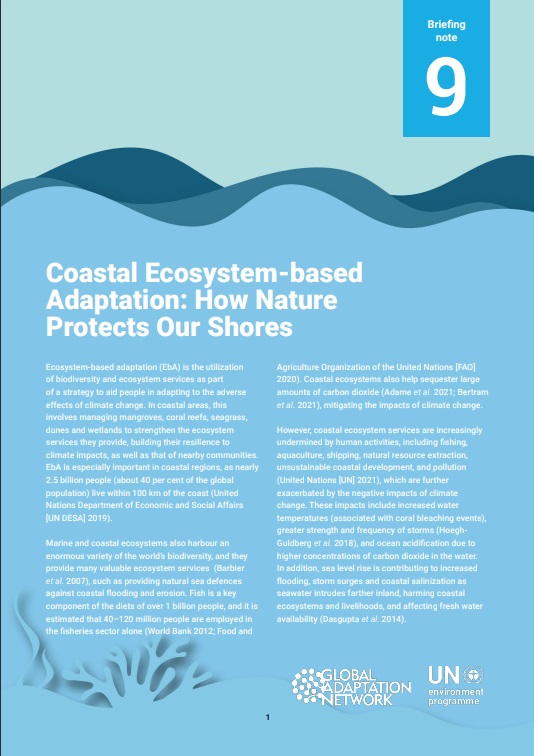🌿 COP 30 - Building a Greener Tomorrow
The 30th UN Climate Change Conference (COP 30) is taking place in Belém, Brazil. Stay informed about global climate actions, negotiations, and live sessions from 10 – 21 November 2025.
Get Updates
Coastal Ecosystem-based Adaptation How Nature Protects Our Shores

Files
Date
January, 2019Author(s)
- UN Environment programme
Abstract
Ecosystem-based adaptation (EbA) is the utilization of biodiversity and ecosystem services as part of a strategy to aid people in adapting to the adverse effects of climate change. In coastal areas, this involves managing mangroves, coral reefs, seagrass, dunes and wetlands to strengthen the ecosystem services they provide, building their resilience to climate impacts, as well as that of nearby communities. EbA is especially important in coastal regions, as nearly 2.5 billion people (about 40 per cent of the global population) live within 100 km of the coast (United Nations Department of Economic and Social Affairs [UN DESA] 2019). Marine and coastal ecosystems also harbour an enormous variety of the world’s biodiversity, and they provide many valuable ecosystem services (Barbier et al. 2007), such as providing natural sea defences against coastal flooding and erosion. Fish is a key component of the diets of over 1 billion people, and it is estimated that 40–120 million people are employed in the fisheries sector alone (World Bank 2012; Food and Agriculture Organization of the United Nations [FAO] 2020). Coastal ecosystems also help sequester large amounts of carbon dioxide (Adame et al. 2021; Bertram et al. 2021), mitigating the impacts of climate change. However, coastal ecosystem services are increasingly undermined by human activities, including fishing, aquaculture, shipping, natural resource extraction, unsustainable coastal development, and pollution (United Nations [UN] 2021), which are further exacerbated by the negative impacts of climate change. These impacts include increased water temperatures (associated with coral bleaching events), greater strength and frequency of storms (Hoegh Guldberg et al. 2018), and ocean acidification due to higher concentrations of carbon dioxide in the water. In addition, sea level rise is contributing to increased flooding, storm surges and coastal salinization as seawater intrudes farther inland, harming coastal ecosystems and livelihoods, and affecting fresh water availability (Dasgupta et al. 2014).
Citation
UN Environment programme
Publisher
Global Adaptation Network
Rights Holder
UN Environment programme
URI
https://knowledgehub.pksf.org.bd/collections/NmFHNEVvR3lSUWt6cTVYMisxYTE4dz09
